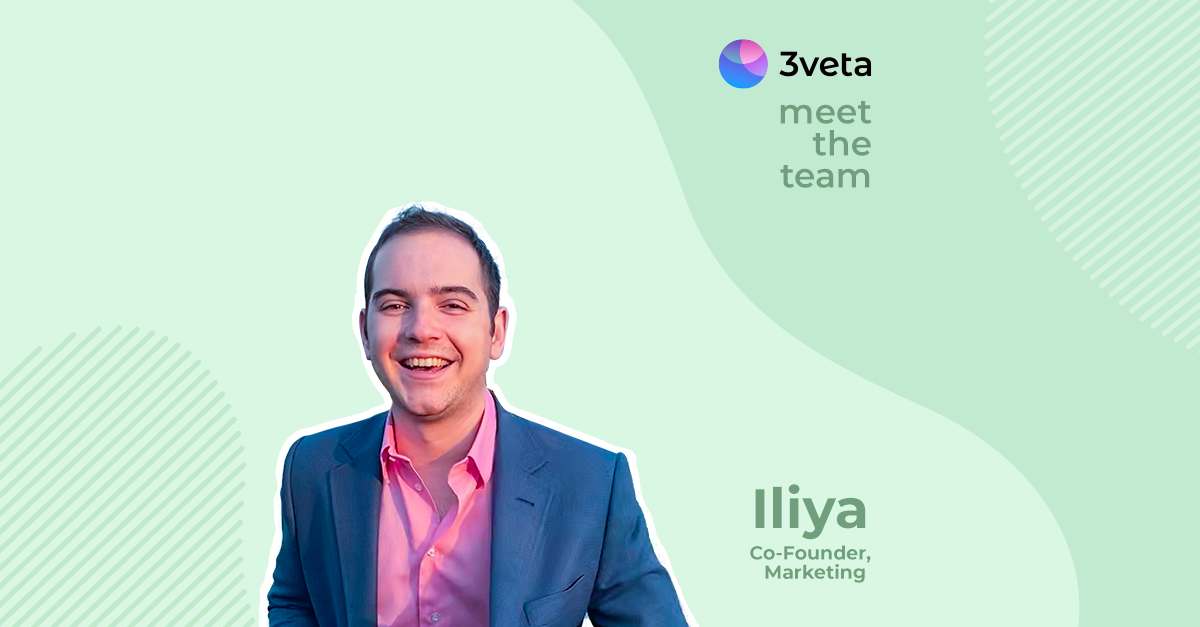The next addition to our ‘Meet the Team’ series is finally here, and we can’t wait to get you acquainted with Iliya’s story!
For us, the regular muggles, math exams have been the worst nightmare during high school. However, Iliya not only enjoyed the exact sciences but also participated in math competitions.
So, it comes as no surprise that completing his degree in Economics & Finance was not that challenging for him at all.
Iliya Valchanov is one of the co-founders of 3veta and is Head of Marketing. But, this isn’t his first start-up rodeo. Previously, he has been a part of 365 Data Science – an educational venture that has helped over 1,000,000 data science professionals all over the world.
Let’s find out what else he has to share.
So first thing first, tell us about your previous education. How did you end up studying in Italy?
Iliya: Back in high school, I was competing in Mathematics. I was probably 10 years old when my family found out that I was quite good at it. So I started pursuing this and people always expected me to continue studying Мath as a part of my higher education.
But, I didn’t see much promise in studying Мathematics at university then. Today, I recognize this as a foolish belief, but I am still quite happy with my education of choice.
I graduated from Bocconi University in ‘International Economics, Management, and Finance’ with a focus on Finance. Of course, I chose all the Math-heavy electives I could.
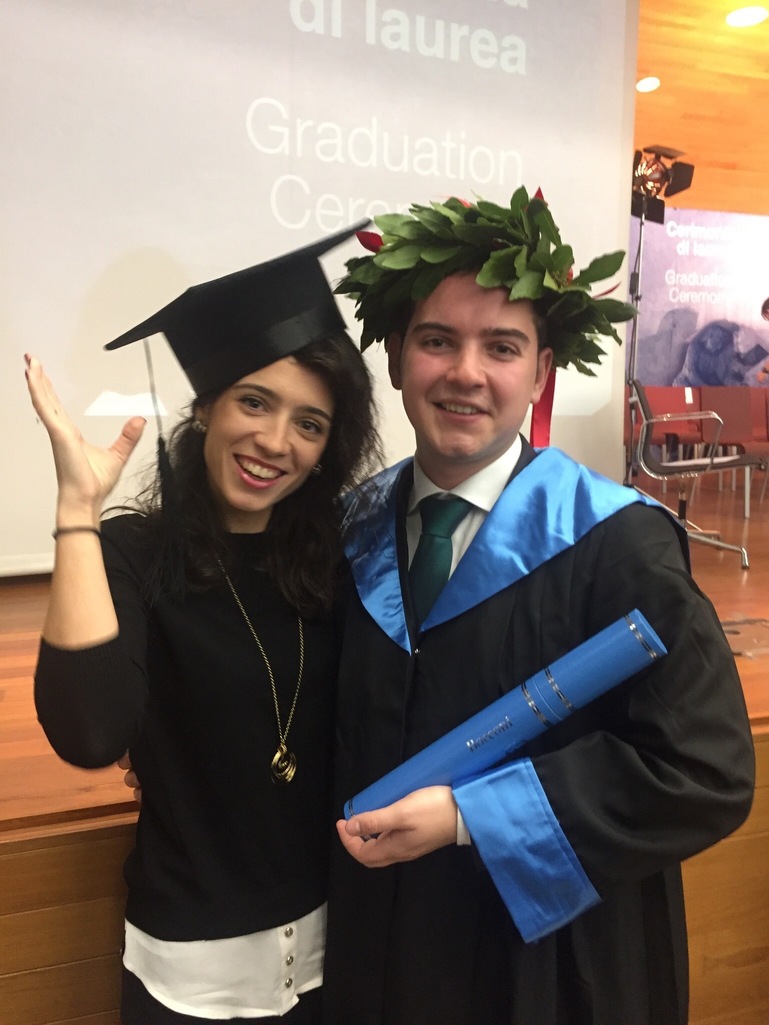
How did I end up in Italy precisely? Well, Bocconi is a great university. Hands down one of the best in Europe (and the world) for business. To be honest though, what really made the choice much easier was that I got a Merit scholarship.
At the end of my degree, I went to China for a semester to do my exchange in SUFE (Shanghai University of Finance and Economics). In terms of education, this was the main place where I could devote time to actual Math. From a ‘life’ standpoint, so to speak, this experience changed my perspective on just about everything ever.
Amazing! And what about your professional experience before 3veta?
Iliya: After graduating from Bocconi, I was doing my gap year before my Master’s in law at UCL. I was applying rigorously for consulting jobs at different well-known companies. I was also expanding my education by taking the CFA (Certified Financial Analyst) exams. You know, I was determined to learn as much as possible.
That’s when a couple of my friends told me they were working on a start-up. It was about creating online courses and they asked me if I wanted to join.
For one reason or another, something didn’t work out for me at those consulting interviews. And, in hindsight, it’s all for the better. I joined the start-up.
It was just four of us in a very small office. Although the projects I was working on hadn’t picked up eight months from the time I joined, I was certain that online education was the next big thing. And, I wanted to be there.
So, I declined the Master’s degree offer, I stopped thinking about finding another job, and I fully devoted myself to this company. This is how I became a co-founder of 365 Data Science.
As a Finance graduate at first I didn’t know what data science was. But after a bit of research, it turned out that the heavy Math I was studying in my electives both at Bocconi and in China was practically what data science people called machine learning (ML) and artificial intelligence (AI). Not only that, I had trained numerous machine learning models, which in business school fell under the topic of Econometrics.
Overnight, I realized that my skillset: Business + Economics + Finance + Math + some coding, as well as my affinity for teaching, was extremely well suited for data science. So, I started creating online courses. My first online course was ‘Statistics for Data Science and Business Analysis’ and was quite successful.
Soon after it came to life, we created a roadmap of a total of 12 courses that we believed are needed to become a data scientist. Together with the 365 team, we built arguably the most comprehensive online data science program out there.
Currently, there are more than 35 online courses, created by 365 Data Science, and more than 1,000,000 students around the world who have taken them.
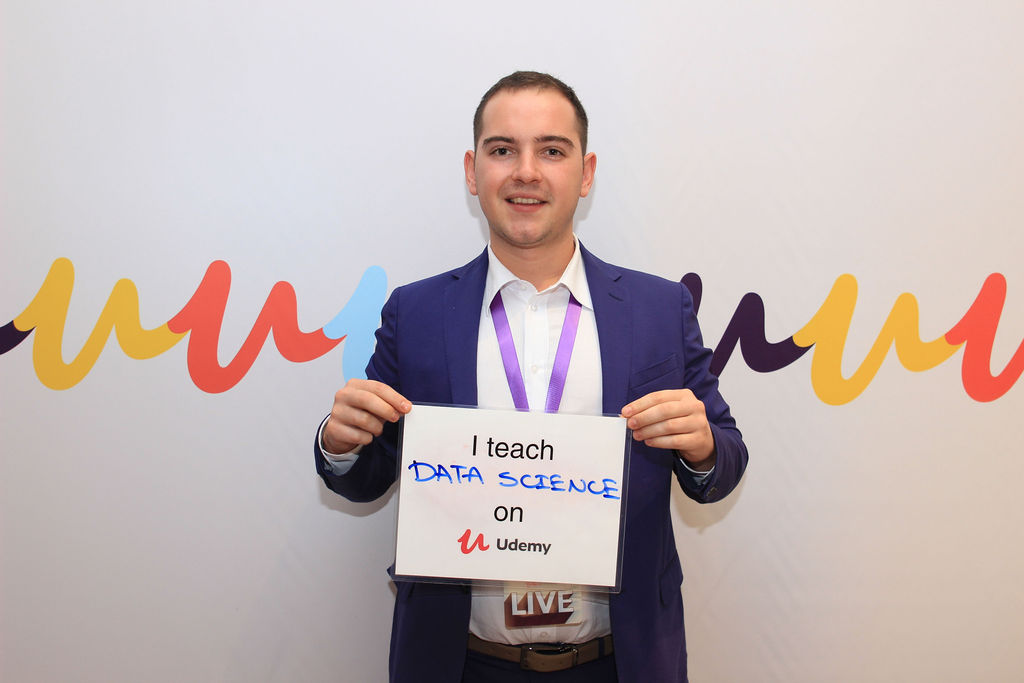
We can say that you have experience in the online education industry, and you were also a top student and a merit-based scholarship recipient. What did offline education give you?
Iliya: Basically, it’s all about meeting people: your professors, professionals in the field, and of course students. With your peer students, you’ll meet a lot of like-minded people, interested in the same things as you, having similar goals to yours.
At the same time, they’ll have different backgrounds, different experiences. It is irreplaceable to meet all these new people and broaden your point of view and build these relationships with people from different cultures.
Reflecting on this, I think the main thing about going to university is to be able to understand another person’s perspective and learn from it, put in Layman’s terms.
Sounds quite trivial, but it is actually quite deep. I need to elaborate on this, sorry for taking extra time.
This point refers to developing the theory of mind. Theory of mind describes the ability to put yourself in others’ shoes and understand people from different backgrounds, cultures, industries, needs, and so on. It is absolutely fundamental for being successful in whatever you do that involves other people.
While this is a process that starts when you are a child, I think it is nurtured and redefined by changing your environment drastically.
I can think of no better trigger event than going to study abroad.
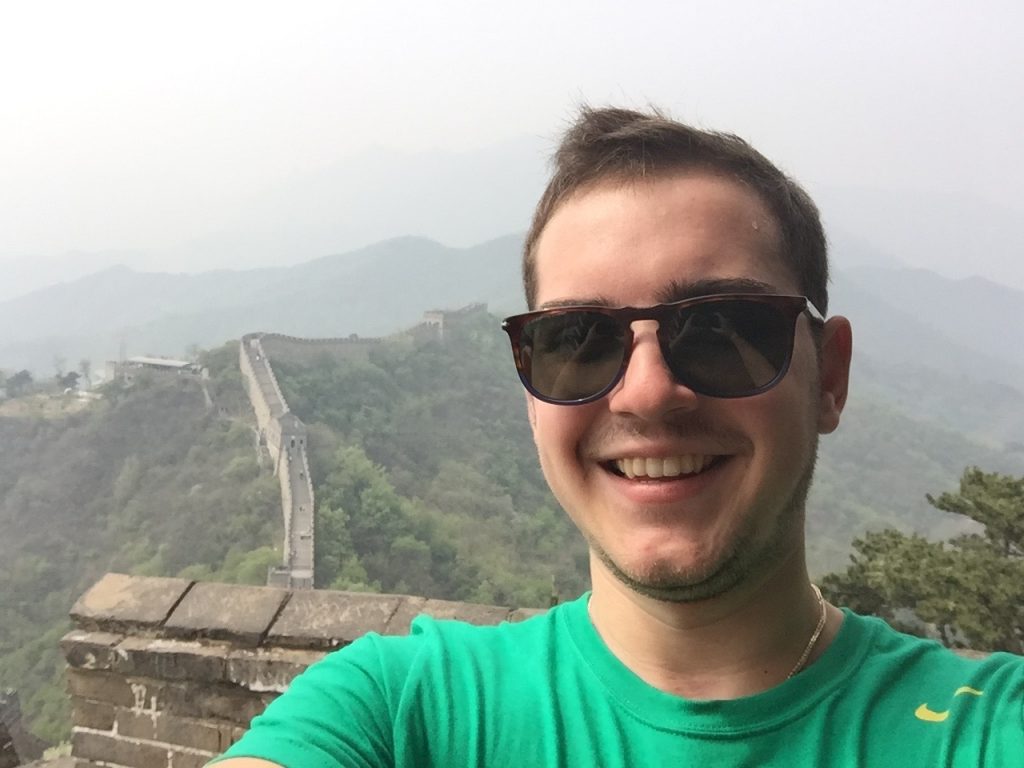
So, would you encourage young people to go for formal education? Or, do you think that the future is online-based?
Iliya: Honestly, if you want to develop a skill, you don’t need to go to university, you just go online, learn the skill, practice it, and master it.
Let me throw another theory into the conversation. I have a feeling you are starting to like these.
There is this thing called just-in-time learning that many people are practicing. Whenever you need something, you just learn about it either by reading or watching a video, or whatever. Then you practice it immediately after, and this gives you the best learning experience possible.
Don’t get me wrong, I think universities will never go out of fashion. However, in the aspect of learning skills, universities are very clumsy. It takes two to five years to graduate and quite often the materials you are using are outdated.
You know the quote ‘Tell me and I forget; teach me and I remember; involve me and I learn’. Just-in-time learning closes the full circle almost immediately. With universities, you close the circle years after you’ve studied something. This makes the whole learning process highly inefficient.
Going to university is irreplaceable as humans are social creatures. We need to meet people, make friends, form a network with them. My best man at my wedding is from my university. When it comes to skills though, most of my learning has been self-learning.
So my next question is related more to the generation that is living almost fully online and is feeling overwhelmed by that. Technology has found its place in all of our daily activities and sometimes it’s just too much for us to handle. Is this happening to you as well? Is there a time when you need to take a break and unplug from the web?
Iliya: Personally I don’t feel I have to unplug. I do work on a PC. But closing the PC usually means that work for the day is over.
‘How so? Aren’t you working on your phone, Iliya?” – you may ask. My phone is ‘read only’ when it comes to working. I don’t answer emails from my phone. I am informed of what’s going on but I maintain my work-life balance by engaging only on a PC.
Even so, my smartphone screen time is relatively low. I average around 1.5 hours per day (yes, I do monitor it). This includes phone calls, work, social media, videos, articles, everything.
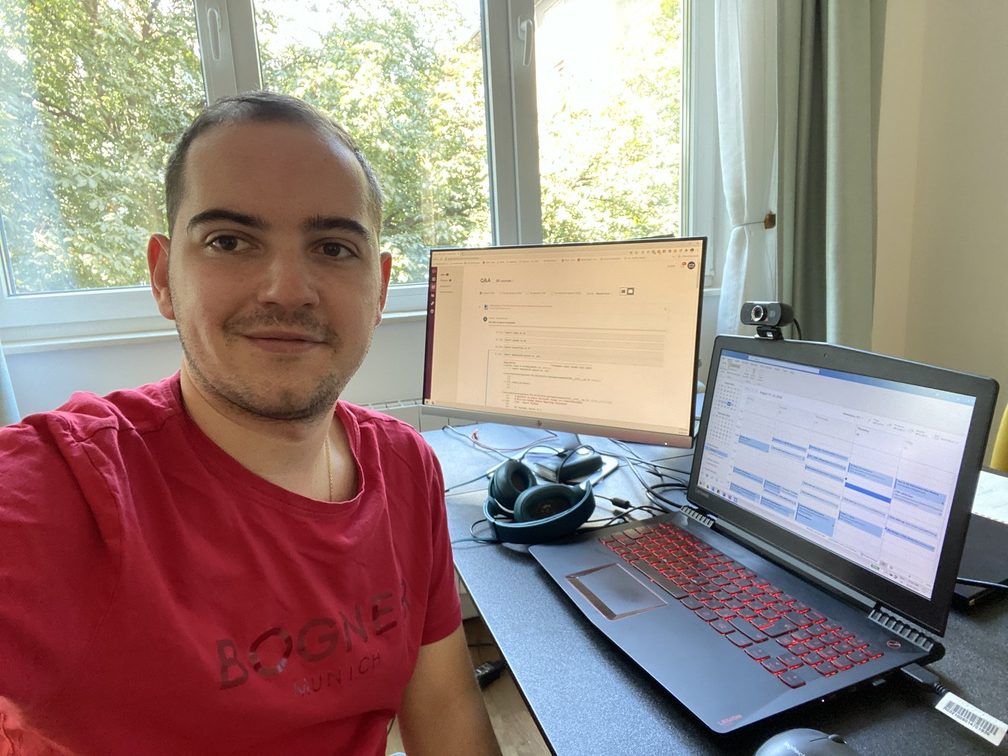
Finally, I purchased a smartwatch recently. So, sometimes I leave my phone at home and I go out just with my watch. Come to think of it, one can say I’ve been trying to unplug for a bit.
However, the idea that I can go without my computer, smartphone, or Internet connection for more than two days is a bit unsettling. I think it is even irresponsible –mainly to the people that may need you. That’s why I don’t do it and I don’t recommend it.
I was wondering if your previous experience in online education has something to do with your decision to create an online consultant scheduling software?
Iliya: Everything I have done before has brought me to where I am today. So the answer surely is yes. To be more specific, though, it is not very much related to my experience as a teacher as it is to working and creating online.
I’m super enthusiastic about software, digital nomad life, and so on. I am fascinated by tools that can help your productivity but also empower people who are less tech-savvy.
No matter your age or technical preparation, you should be able to be a bigger part of society by working online. And, easy-to-use software is what helps the most.
I think helping others achieve more is what drives me –doesn’t matter how.
And how do you envision the future of the workplace in 10 years?
Iliya: Oh, absolutely online.
When we were creating online courses some years ago, the team could be remote, the students were remote as well. Everything was happening in a different time zone. All we needed was a computer and a stable Internet connection.
However, back then this was not a common practice because connectivity was poorer, the Internet was not everywhere. Even nowadays, there are some inconveniences while traveling. Yes, you can work from anywhere, but you are always wary of the Internet connection.
So, there are 3 main drivers of the future of work: connectivity, software, and hardware.
As to connectivity, I am absolutely certain that in 10 years’ time this is not going to be an issue anymore. So, we’re going to stay connected wherever we go.
We’ll also have much better software. Our product is a prime example of software advancement. We have new technology, in fact, better technology. And we’re making it very easy, very light for Internet usage, very light for ‘brain’ usage.
Finally, after software innovations, there are hardware innovations. So holograms, VR, cameras that follow you around the room, and all that jazz. They are not fantastical. They are already here, but they are too expensive to be used by the public. However, many companies are working on their accessibility and it’s merely a matter of time.
Okay, so I would like to add to this question by asking you if there are professions that in your opinion can become fully online, but would be better if they don’t? After all, in-person communication is crucial.
Iliya: Yeah, I know a couple. A big one is speech therapy, I’ll say. Usually, speech therapists are people who teach children how to pronounce words and letters better. And when you’re live face-to-face with a child, you can create a much better connection. You can build trust.
Now, if we’re talking about psychology, psychotherapy, and so on, it’s also a bit complicated. But being a grown adult is different, right? A child cannot understand this very well (think about the theory of mind from before).
So, I think professions that consist of work with children couldn’t and shouldn’t be done online. Primary school, speech therapy, sports, etc.
I’m going to change the topic a bit and ask you how do you feel working with friends and family?
Iliya: Well, sometimes it’s tough. Sometimes it’s easy because you know the strengths and weaknesses of the other person.
So, if you’re working with someone new, you have to get to know them, see what they’re good at. It takes time to note the things they fail at and the ones they excel at. When you work with friends and family, getting to know each other is no longer an issue.
Also, it’s very empowering. For instance, working with Masha, my wife, means that we are sharing knowledge constantly. This way I don’t have to know everything and be good at everything, I can trust her with some of the knowledge.

So, on to the negative side. Some arguments could spiral out of control and that’s because the hierarchy is less well-established than in a company where people are strangers. The important thing is to have conflict resolution mechanisms that can help you close the problematic topics as soon as possible and move forward.
And as a marketing specialist, what is the biggest challenge that you have faced so far in 3veta’s journey?
Iliya: I think of myself more as a marketing enthusiast.
But, I believe being a marketer nowadays is this collection of technical knowledge and marketing understanding; as well as being able to recognize compelling visuals (not even create them).
As a marketer, you also need a lot of data. In 3veta, we started from a brand new website with no users and no website visits. Therefore, we didn’t have any data.
The biggest challenge for us was to acquire this initial data.
Having data helps not only with knowing what users you’ve got. It is also crucial for quality assurance. Only if you have data on bugs can you fix them.
Finally, and most importantly, you need a critical amount of data before you can start leveraging machine learning when running ads.
Getting there was definitely our biggest challenge. And, it still is a challenge.
I’m used to working with enormous datasets, I know hundreds of ways in which I can work with the information. However, when the dataset is small, the techniques are quite limited.
What about the thing that you love the most about 3veta? I know that Masha’s favorite feature is the website builder. What about yours?
Iliya: Okay, so I have two things that I love.
The first one is that you can get set up and start your online business without having to integrate any other software. In five minutes, you’re up and running. Zoom is incredible, but you have to connect it with all these other apps to make it more than a video conferencing tool. And, this is the best thing about 3veta.
The second one is a person’s identity on 3veta. We let our users have it.
You can put your own branding and your own logo. This is your own place on the Internet, which is truly yours. You don’t compete with anyone on it and there are no rankings.
It is just you. With our technical expertise behind your back.
Okay, and is there something that you would like to improve at 3veta?
Iliya: I want to improve structured data. It is actually more sophisticated than most I’ve seen online, but I have this vision about how it can be perfect.
It’s absolutely the biggest waste of time for our team to make it happen. Even so, that’s something feature-wise that I would like to change. Maybe in a year or two…
So my next question was, how do you see 3veta’s future in a few years from now, but I think you just answered that.
Iliya: Oh no, structured data is a very minor thing.
In a few years, I want to see 3veta become a recognized tool to build your own workspace with your own branding, on your own terms, with your own client list.
In 10 years, I want to do holograms.
It would be way cooler to have holograms, by the way. So yeah, we are looking forward to that!
Iliya: Yeah, I’m sorry for the inconvenience. I’ll do my best to bring you some holograms as soon as possible.
We are counting on you. Now, I have two more questions, and they’re a bit more personal. Do you have any hidden talents or hobbies that you would like to share with our readers?
Iliya: If I have hidden hobbies, they shall remain hidden 😊
As for the hidden talents, I could say that I’m handy with all the physical tools. I’m good at repairing things around the house. I’ve purchased a bunch of tools, watched a number of YouTube tutorials, and put them to work. It comes easy to me.
Apart from that, Iskren and I are doing this podcast, which is kind of work-related, kind of a hobby.
The name is Life Math Podcast and you should definitely check it out.
We are not getting financial gains from it, but we are super satisfied so I think this is what people call a hobby.
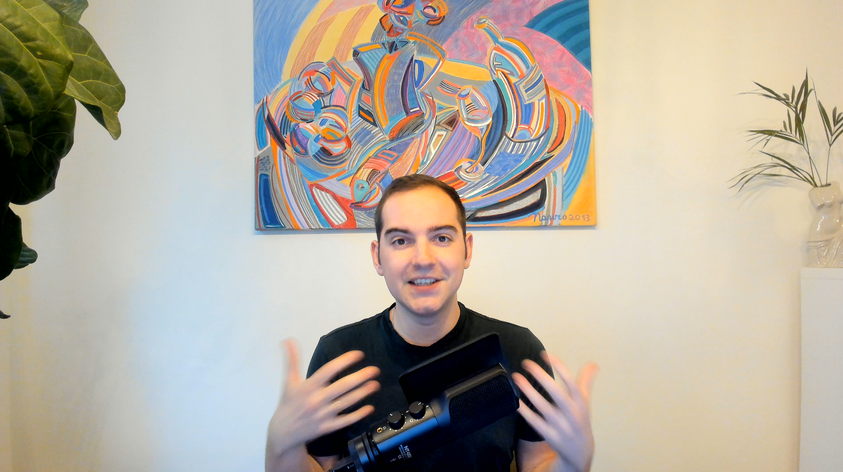
Thank you so much for this interview, Iliya. It was fun! As for your talents, I found another one of yours! James Joseph Sylvester said that ‘Mathematics is the music of reason’, so maybe you should consider yourself a musician!
Read interviews with other team members!
Iliya Valchanov is co-founder of 3veta.com, an end-to-end solution for team communication and collaboration. He is also co-founder of 365 Data Science and a data science instructor on Udemy with more than 900,000 students.
